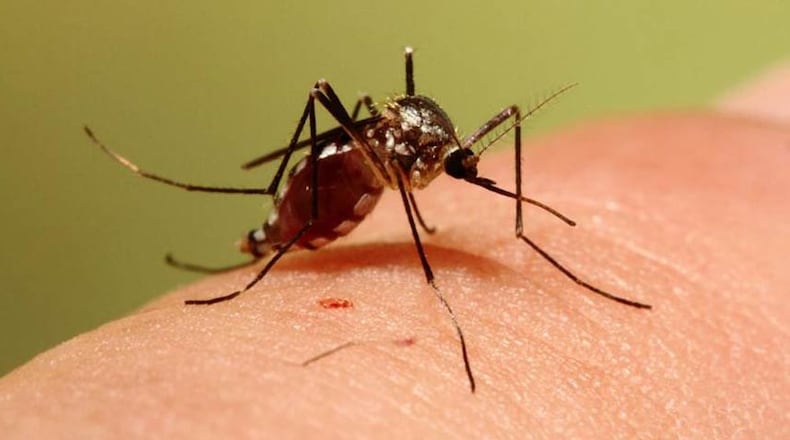It is not uncommon for a mosquito to test positive for West Nile Virus, Public Health said. Public Health’s program is designed to educate the public about the diseases mosquitos may carry, how they can protect themselves from mosquito bites, and how they can help to reduce the mosquito population.
The mosquito was caught in the area where Public Health will be spraying for next week, including Vandalia Rec Center, Poplar Cemetery, Helke Park and the following streets surrounding the park: Randler, Bosco, Pool, Romanus, Marcellus, Neri, Damian, Paula, Desales, Alkaline Springs, Hertlein and Pius.
Public Health will spray those areas on Monday at dusk, though the exact time of spraying is weather dependent. Signs will be placed in the area of the spraying, and residents may call 937-224-8793 for more information.
“Mosquitoes do carry diseases that can in some instances be serious, so you should always practice mosquito protection when you’re out in the area where there’s mosquitoes,” Suffoletto said.
Public Health will be spraying Duet, an adulticide mosquito control product. The Environmental Protection Agency has evaluated Duet and determined that using it according to label guidelines in residential areas, including in and around gardens and over non-organic agricultural crop areas, does not pose a significant risk to people or animals. For more information about Duet visit https://www.clarke.com/product/duet-adulticide/. Residents in the area of the spraying are also advised that:
- People and pets may be outdoors.
- The mist will dissipate within 5-30 minutes depending on weather conditions.
- The Duet spray is not corrosive and does not stain.
There have been no reported human cases of West Nile Virus in Montgomery County in 2023, according to Public Health, and there were three human cases reported in 2022.
West Nile virus is the leading cause of mosquito-borne disease in the continental U.S., Public Health said. It is most commonly spread to people by the bite of an infected mosquito. Cases of West Nile virus occur during mosquito season, which starts in the summer and continues through fall.
There are no vaccines to prevent, or medications to treat, West Nile virus in people, but most people infected with West Nile virus do not feel sick. About one in five people who are infected develop a fever and other symptoms. About one out of 150 infected people develop a serious, sometimes fatal, illness, Public Health said.
You can reduce your risk of West Nile virus by using insect repellent and wearing long-sleeved shirts and long pants to prevent mosquito bites.
Protect yourself from West Nile
Public Health recommends taking the following actions to protect yourself from mosquito-borne diseases like West Nile:
- Use EPA-approved mosquito repellent containing DEET and follow the label directions.
- If you are outdoors between dusk and dawn when mosquitoes are most active, be sure to wear long pants, a long-sleeved shirt, shoes and socks.
- Wear light-colored clothing, which is less attractive to mosquitoes.
- Install or repair screens on windows and doors to keep mosquitoes out of your home.
- Make sure all roof gutters are clean and draining properly.
- Eliminate standing water in your yard as well as from flower pots, buckets, and barrels. Change the water in pet dishes and replace the water in bird baths weekly. Drill holes in tire swings so water drains out. Keep children’s wading pools empty and on their sides when they aren’t being used.
For more information, call (937) 225-4362 or visit www.phdmc.org.
About the Author

